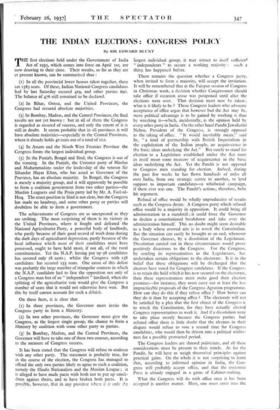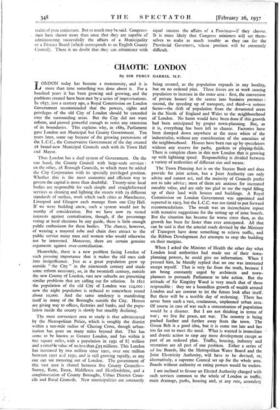THE INDIAN ELECTIONS : CONGRESS POLICY
By SIR EDWARD BLUNT
(r) In all the provincial lower houses taken together, there are 1585 seats. Of these, Indian National Congress candidates had by last Saturday secured 419,' and other parties 69o. The balance Of 476 still remained to be declared.
(2) In Bihar, Orissa, and the United Provinces, the Congress had secured absolute majorities.
(3) In Bombay, Madras, and the Central Provinces, the final results are not yet known : but in all of them the Congress is regarded as assured of success, and only the extent of it is still in doubt. It seems probable that in all provinces it will have absolute majorities—especially in the Central Provinces, where it already holds 40 seats out of a total of 112.
(4) In Assam and the North West Frontier Province the Congress forms the largest individual group.
(5) In the Punjab, Bengal and Sind, the Congress is out of the running. In the Punjab, the Unionist party of Hindus and Muhammadan under the leadership of the veteran Sir Sikandar Hayat Khan, who has acted as Governor of the Province, has an absolute majority. In Bengal, the Congress is merely a majority group, and it will apparently be possible to form a coalition government from two other parties—the Muslim Leaguers and the Proja party led by Mr. A. Fazl-ul- Huq. The exact position in Sind is not clear, but the Congress has made no headway, and some other party or parties will doubtless be able to form a government.
The achievements of Congress are as unexpected as they are striking. The most surprising of them is its victory in the United Provinces, where it fought and defeated the National Agriculturist Party, a powerful body of landlords, who partly because of their good record of work done during the dark days of agricultural depression, partly because of the local influence which most of their candidates must have possessed, ought to have held most, if not all, of the rural constituencies. Yet the N.A.P. having put up 98 candidates has secured only 18 seats ; whilst the Congress with 138 candidates has secured 133 seats. One cause of this defeat was probably the large number of triangular contests in which the N.A.P. candidate had to face the opposition not only of a Congress man but of an " independent " landlord, when the splitting of the agriculturist vote would give the Congress a number of seats that it would not otherwise have won. But this by itself cannot account for such a debacle.
On these facts, it is clear that (0 In three provinces, the Governor must invite the Congress party to form a Ministry.
(2) In two other provinces,' the Governor must give the Congress, as the largest single group, the chance to forin 'a Ministry by coalition with some other party or parties.
(3) In Bombay, Madras, and the Central Provinces, the Governor will have to take one of these two courses, according to the measure of Congress success.
It has been stated that the Congress will refuse to coalesce with any other party. The statement is probably true, for in the course of the election, the Congress has managed to offend the only two parties likely to agree to such a coalition, namely the Hindu Nationalists and the Muslim League ; it is alleged to have made pacts with both not to put up candi- dates against theirs, and to have broken both pacts. It is possible, however, that in any province where it is only the largest individual group, it may attract to itself sufficient " independents " to secure a working majority : such a thing has happened before.
There remains the question whether a Congress party, when invited to form a majority, will accept the invitation. It will be remembered that at the Faizpur session of Congress in Christmas week, a decision whether Congressmen should take office if occasion arose was postponed until after the elections were over. That decision must now be taken ; what is it likely to be ? Those Congress leaders who advocate acceptance of office argue that however had the Act may be, more political advantage is to be gained by working it than by wrecking it—which, incidentally, is the opinion held by every other party in India. On the other hand Pandit Jawaharlal Nehru, President of the Congress, is strongly opposed to the taking of office. " It would inevitably mean," said he, " a kind of partnership with British Imperialism in the exploitation of the Indian people, an acquiescence in the basic ideas underlying the Act." But surely to stand for election to a Legislature established under the Act must in itself mean some measure of acquiescence in the basic ideas underlying the Act. Yet the Pandit is not opposed to Congress men standing for election. Indeed, during the past few weeks he has flown hundreds of miles all over India, from one strategic centre to another, to lend support to important candidates—a whirlwind campaign, if there ever was one. The Pandit's actions, therefore, belie his argument.
Refusal of office would be wholly unproductive of results such as the Congress desire. A Congress party which refused office would be a majority in opposition. It could bring all administration to a standstill ; it could force the Governor to declare a constitutional breakdown and take over the administration himself. This no doubt might seem desirable to a body whose avowed aim is to wreck the Constitution. But the situation can easily be brought to an end, whenever the Governor chooses, by a dissolution of the Legislature. Dissolution carried out in these circumstances would prove positively disastrous to the Congress. For the Congress; by sending its representatives to the Legislatures, has undertaken certain obligations to the electorate. It is in the belief that these obligations will be discharged that the electors have voted for Congress candidates. If the Congress is to retain the hold which it has now secured on the electorate, then these representatives must make good their election promises—for instance, they must carry out at least the less impracticable proposals of the Congress Agrarian programme. How can they do this if they refuse office ? How better can they do it than by accepting office ? The electorate will not be satisfied by a plea that the first object of the Congress is to wreck the Constitution, for they have actually elected Congress representatives to work it. And if a dissolution were to take place merely because the Congress parties had refused office there is little doubt that the electors in their disgust would refuse to vote a second time for Congress candidates, who would then be driven into a political wilder- ness for a possibly protracted period.
The Congress leaders are shrewd politicians, and all these considerations must be present to their minds. As for the Pandit, he will have to weigh theoretical principles against practical gains. On the whole it is not surprising to learn that, according to informed opinion in India, the Con- gress will probably accept office, and that the extremist Press is already engaged in a game of Cabinet-making.
What the Congress will do with office once it has been accepted is another matter. Here, one must enter into the realm of pure conjecture. But so much may be said. Congress- , men have shown more than once that they are capable of administering successfully the affairs of a Municipality or a District Board (which corresponds to an English County Council). There is no doubt that they can administer with equal success the affairs of a Province—if they choose. It is more likely that Congress ministers will set them- selves to make as much trouble as they can for the Provincial Governors, whose position will be extremely difficult.



















































 Previous page
Previous page